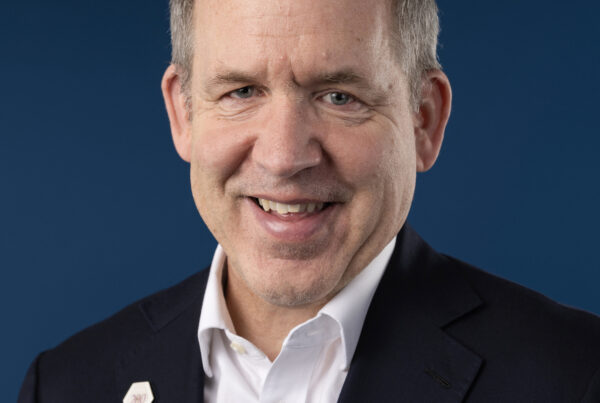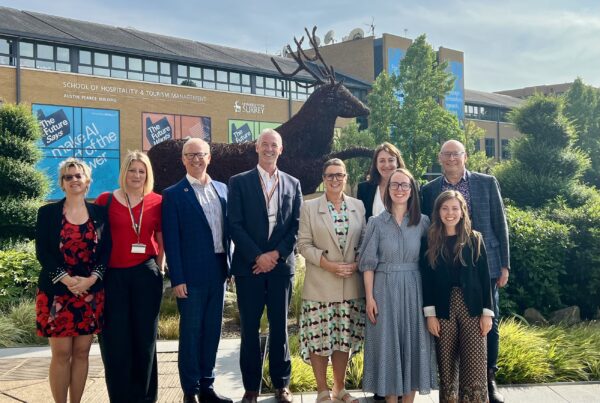Back to the Future: Opinion

Author: Martin Betts | As seen in Campus Review
I was reminded of the past over the holidays when my kids bought me a turntable that allowed my old vinyl collection to be dusted off out of sleeves, mostly unopened since the 1980s.
I was amazed they still played. Of course, the tracks of David Bowie‘s ‘Hunky Dory’ still jumped on the scratches in all of the old places. But otherwise, it sounded rich, familiar and nostalgic.
I remember acquiring my record collection through weekly visits to Parrot records, in my school lunch hour, where the latest release came away in the branded plastic bag and was carried as a badge of honour. Sharing your tastes, and your latest acquisition, with your community was a big part of the joy of it all.
It was, and is, a lot less convenient of course. Jumping up and turning the Psychedelic Furs album over after four songs seems so cumbersome compared with the continuous playlists and personalised radios that Spotify now offer me. They do so with algorithms that have analysed my listening habits, and suggested those from like-minded others. My partner and I have now even taught Spotify to learn our combined music tastes, not just mine alone.
They allow us to play music from a phone or a watch, and through a boom box, that can slot into a bag with the mobile modem. We can transfer endless personalised music between city and beach house now we have joined the growing band of Australians taking advantage of a regional sea change. We can now work from anywhere, and our music and other forms of entertainment can come with us. The greatly loved new turntable has to stay in the city.
So, will our dominant music listening future be local, quaint, familiar and retro? Or will we go more to the digital, platform-based, global, ubiquitous and convenient route? I don’t really care much, and I am sure others even less so. A bit of both might suit us best. As long as we can experience it at either the city or the beach, I am sure we will enjoy it. But what about the future of higher education?
The increase in tree and sea changes, the move to the regions, and the retro movement and growth of local communities, are all major drivers for universities right now. I hear an increasing number of vice chancellors talk about 2021 being a year of forging stronger links with their internal and external communities and giving greater credence to local context. Maybe this is the age of the regional university and of community mission and engagement coming the fore. Maybe what will emerge will be a stronger university focus on community purpose, matching changing patterns of living and working practices.
Or will the Netflix or Spotify phenomena disrupt how we experience higher education in the same way it has how we listen to music or experience home entertainment? Will our engagement with learning increasingly become more mobile, platform-based, globally provided, and algorithm-managed? I am enjoying exploring a number of these issues in a forthcoming book on the new learning economy being co-authored with Michael Rosemann of the Centre for the Future Enterprise at QUT.
There are many leaders, including those who are leading in universities right now, with a great sense of uncertainty about how the next little while will play out. The questions to date have been mainly about what teaching programs and research centres to keep and what organisation structures to adopt. They have included some ventures, beyond all of our accelerated move to ubiquitous online delivery, to new models of sustainable blended learning but largely based on the familiar, traditional and well-known institutional business model.
The biggest question, for us all, seems to be what business model will lie behind how we buy our music, or buy our higher education, in the future. Retro, localised, branded and community-based with local expertise we know, trust, and endure the scratches and imperfections of? Or global, personalised, digital, optimised, with world-class content we have endless access to?
The answer to this question seems of great consequence for many in our universities, but most particularly to its leaders. The strategy of positioning ourselves for the community-focused local university might be completely different than the one that will prepare us for a disrupted higher education world that might be emerging. Or can you do both at the same time?
We covered a number of these issues in last week’s HEDx podcast with Professor Duncan Bentley, vice chancellor of Federation University, as our guest. He sees opportunities for universities to focus on their care for their staff and serving their communities and to implement this as a differentiated strategy.
The fresh and relaxing move to the regions has so much going for it. But is a sea change or tree change going back to the future or opening up a completely new and different world of technical disruption? What is really going on out there?







